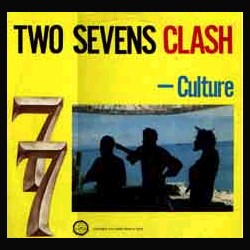| Two Sevens Clash | ||||
|---|---|---|---|---|
 | ||||
| Studio album by | ||||
| Released | 1977 | |||
| Recorded | Joe Gibbs Recording Studio, Kingston, 1976 | |||
| Genre | Reggae | |||
| Length | 33:14 | |||
| Label | Joe Gibbs | |||
| Producer | Joe Gibbs | |||
| Culture chronology | ||||
| ||||
| Review scores | |
|---|---|
| Source | Rating |
| AllMusic | |
| Christgau's Record Guide | A+ [2] |
| The Encyclopedia of Popular Music | |
| Pitchfork Media | 9.0/10 [4] |
| Rolling Stone | |
Two Sevens Clash is the debut album by roots reggae band Culture, recorded with producer Joe Gibbs at his own Joe Gibbs Recording Studio in Kingston in 1976, and released on Gibbs' eponymous label in 1977 (see 1977 in music). The album's title is a reference to the date of 7 July 1977. [6] [7]
Contents
The liner notes of the album read: "One day Joseph Hill had a vision, while riding a bus, of 1977 as a year of judgment - when two sevens clash - when past injustices would be avenged. Lyrics and melodies came into his head as he rode and thus was born the song "Two Sevens Clash" which became a massive hit in reggae circles both in Jamaica and abroad. The prophecies noted by the lyrics so profoundly captured the imagination of the people that on July 7, 1977 - the day when sevens fully clashed (seventh day, seventh month, seventy-seventh year) a hush descended on Kingston; many people did not go outdoors, shops closed, an air of foreboding and expectation filled the city."
Music critic Robert Christgau named the album one of the few import-only records from the 1970s he loved, but yet was omitted from Christgau's Record Guide: Rock Albums of the Seventies (1981). [8]
The album was reissued in 1988 with different cover art, and with the track listing altered with the last five tracks of the ten tracks listed first, and tracks 1–5 becoming tracks 6–10.[ citation needed ]
To mark its 40th anniversary, the album was reissued again in 2017. This version features an additional disc of remixes and dub versions. New sleeve notes were written by Don Letts.[ citation needed ]